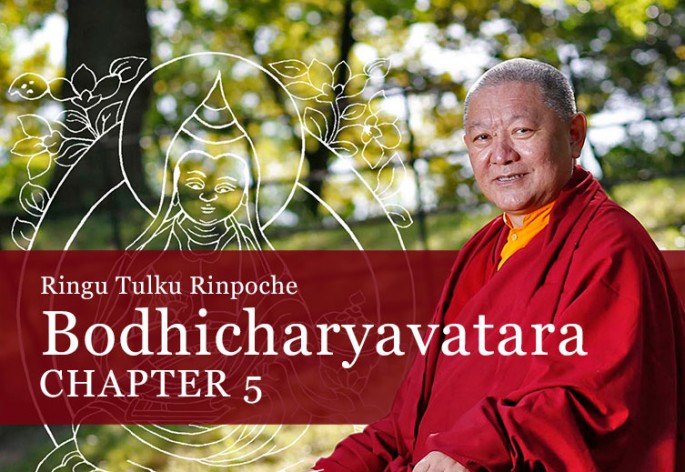BA5_24-28 The Disadvantages of Not Having Awareness
With video BA5_24-28 Rinpoche explains stanzas 24 to 28 of the fifth chapter of the Bodhicharyavatara. This begins the section on how to train in vigilant introspection. The first instruction is to reflect on the disadvantages of not having introspection, or awareness.
To view the video, simply click on the image to view all the Chapter 5 videos.
If you prefer listening to the teaching in audio, use the audio player below.
The audio as well as the audio translations in different languages and the transcript of this teaching are all available on Chapter 5 page.
We are also studying the commentary transcript on Chapter 5, which you can download here and in the Library section. Further recommended reading: the commentary book by Kunzang Pelden (Khenpo Kunpal), The Nectar of Manjushri’s Speech, p. 172-173.
You’re questions are most welcome. Please log in and leave your questions for Rinpoche as a comment below, or send them via email to studyquestions[at]bodhicharya.org. It is helpful if you can use one short paragraph and, if possible, less than 80 words. Any questions longer than that may have to be edited so please be concise. Questions will be collected from here on Friday, June 2 2012, and included in Rinpoche’s answers video. After that date please send any questions relating to this video teaching via email to studyquestions[at]bodhicharya.org.
If you would like to volunteer in making transcripts of Rinpoche’s online teachings, or in making audio translations to your own language, please email us at shedra[at]bodhicharya.org.
If you would like to make a personal offering to Rinpoche along with a message, please use the button below:
You can find out more about how to support the archive, while gaining access to Rinpoche's online teachings, using the button below.

Dear Rinpoche
Firstly, thank you for your extended commitment to giving these precious Bodhicitta teachings in such an accessible and modern way.
My question pertains to stanza 26 of chapter 5, which highlights that the presence of faith, devotion, diligence and learning, may be insufficient, if not accompanied by mental vigilance and introspection as well.
Possible techniques to transform negative emotions would seem to include: generating a positive state of mind; mindfulness; and resting in the nature of mind (Ultimately the best if one is able?).
My question relates to the specifically Vajrayana methods of transforming negative emotions into wisdom. Could you please talk about these skilful means techniques, please? Do they involve visualising the Dhyani Buddhas eg Akshobhya/Mitrugpa transforming anger into mirror-like wisdom?
Thank you
Conrad/Karma Changchub